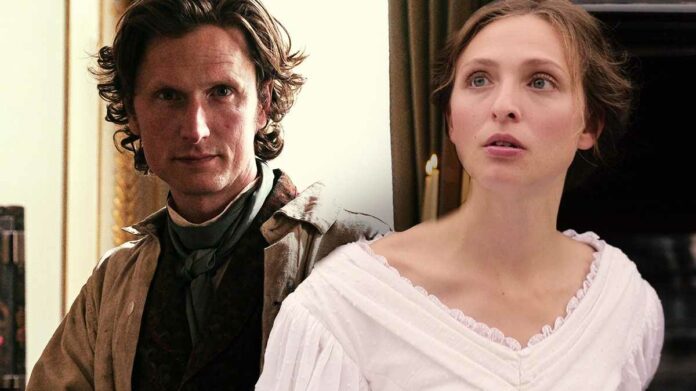This Danish period film is not as tantalizing as one would imagine but rather a tale as old as time. You can’t really call Ehrengard: The Art of Seduction a rom-com because, other than the romantic setting, there isn’t really any romance in this film. Additionally, the comedy falls flat and doesn’t pack a punch like it’s expected to. The film follows a not-so-young artist named Cazotte. On one of his portrait assignments, the Duchess of Babenhausen requests that he teach her young son the art of seduction because there’s a crisis and he must be married off immediately (tell us something new). For his services, the self-attested love doctor wants, in return, a connection with a beautiful woman named Ehrengard. This is when things start to get messy, and the result is a tale of mishaps and scandal.
For the most part, Ehrengard is extremely uncomfortable to watch, like watching a friend being stalked and not being able to tell her. It’s a ridiculous story that gets worse the longer it runs, but I will admit the end is a soothing balm over a gaping wound. I find it rather odd how much credit is given to artists as masters of seduction. It’s possible they may have been, but this trope is a bit redundant in my eyes. I’d rather know why someone is worth painting than how to get in their pants. Jokes aside, for a movie with the word seduction in the title, there isn’t much of it at all. We learn that Cazotte has been with a good many women, and for some reason, the Duchess herself is smitten by him and sets a challenge for him for this same reason. As dapper as he thinks he is, he really just comes across as a stalker and pervert. Directed by acclaimed director Bille August, there was a promise of something epic. What we do get is epic cinematography and some fantastic scenes that look like they’re paintings themselves, which is very apt for what the film is about. It’s not that I particularly hated the film, but there was something mortifying about it. On the other hand, it must be one of the better Netflix films with such a premise because it leaves much more to the imagination than usual.
The film is an adaptation of a book by renowned author Karen Blixen. While I may not have had the opportunity to read the book, I couldn’t help but notice that the film falls somewhat short of capturing the essence noted in the book’s descriptions. I didn’t find it as delightful as they make it out to be on the internet. One aspect that shines in the film is the cast, with each member of the main ensemble delivering commendable performances. However, it’s the portrayal of the Grand Duchess, skillfully brought to life by Sidse Babett Knudsen, that truly steals the spotlight. Her facial expressions, subtle moans, and impeccable comic timing inject much-needed life into this cinematic experience, preventing it from becoming a tedious bore, as is common with period films such as this one. The film’s runtime is relatively short, clocking in at just a little over 90 minutes, and it maintains a quick-paced narrative.
For those, like me, who are unfamiliar with the film’s plot, it initially seems that the main objective is achieved within the first 10 minutes. However, this is where the story takes an unexpected turn, revealing a much broader narrative. It’s possible that my dissatisfaction with the film may stem from the choice of Cazotte as the protagonist. Perhaps if the story had been told from the perspective of Ehrengard herself, it might have been more captivating to witness Cazotte’s struggles in attempting to win over an unyielding woman of grace and honor. Unfortunately, from Cazotte’s viewpoint, Ehrengard comes across as overly reserved and uptight, which hampers the viewer’s ability to connect with her character. In essence, while the film has its merits, it may not fully capture the magic and depth of Karen Blixen’s original literary work.
There’s a particularly stunning viewpoint of the forest lake with the mountains in the background that is absolutely breathtaking, not just for us but for the great artist himself, too. Unfortunately, his intentions are out of place and vulgar, leaving a taste of bile in his mouth. Like I said, this isn’t a rom-com, and maybe I’d have preferred it if it were a comedy-thriller. Ehrengard falls short in terms of bringing something new and unique to the table. Although I will admit it, there’s an element of surprise in the actual contents of the film because they don’t particularly match the title very well. Maybe it could’ve been called Cazotte: The Art of Scandal. While the twist climax of the film was a welcome choice, the conclusion of the film is still quite disappointing, and maybe I’ve come into 2023 hoping for too much.
I personally love a good period piece, and I’ve been keeping up with Netflix’s adaptations (yes, even Persuasion because Dakota Johnson is a gem, and I’d watch anything with her in it). With the massive success of Bridgerton, the OTT platform is definitely trying to churn out what it can in the particular genre of the advanced period (yeah, I made that up) that provides an escape from today’s problems but somehow still feels modern. It’s a strange combination that works sometimes (very rarely) and should not be done otherwise. You could maybe watch Ehrengard: The Art of Seduction on a day with friends when there’s nothing else to do and you’re looking for picturesque scenes and a strong female lead who barely has any lines. I’d give this picture 2.5 out of 5 stars.

